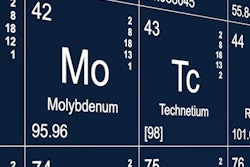The Society of Nuclear Medicine and Molecular Imaging (SNMMI) is collaborating with other imaging- and healthcare-related organizations to once again urge the U.S. Congress to create a sufficient supply in the U.S. of the medical isotope molybdenum-99 (Mo-99).
In open letters to chairs of the House of Representatives and Senate subcommittees on energy and water development, SNMMI and other societies asked legislators to support funding of $67.4 million -- $10 million more than is currently allocated. The funds would provide $27.4 million to finish the program's existing obligations.
Congress passed the American Medical Isotopes Production Act in 2012 to develop a U.S.-based supply of Mo-99 for a wide range of imaging applications. The National Nuclear Security Administration (NNSA) at the Department of Energy (DOE) currently has four cooperative agreements with companies to produce the isotope in the U.S. using non-high-energy uranium, but the projects have taken longer and cost more than expected; the additional funding would ensure the projects are completed.
The Senate version of the bill would increase the limit on each cooperative agreement from $25 million to $35 million. The additional $10 million per agreement would go into effect in the 2018 fiscal year and would be available retroactively to each partner, as long as the partner had contributed $35 million of its own funds.




















